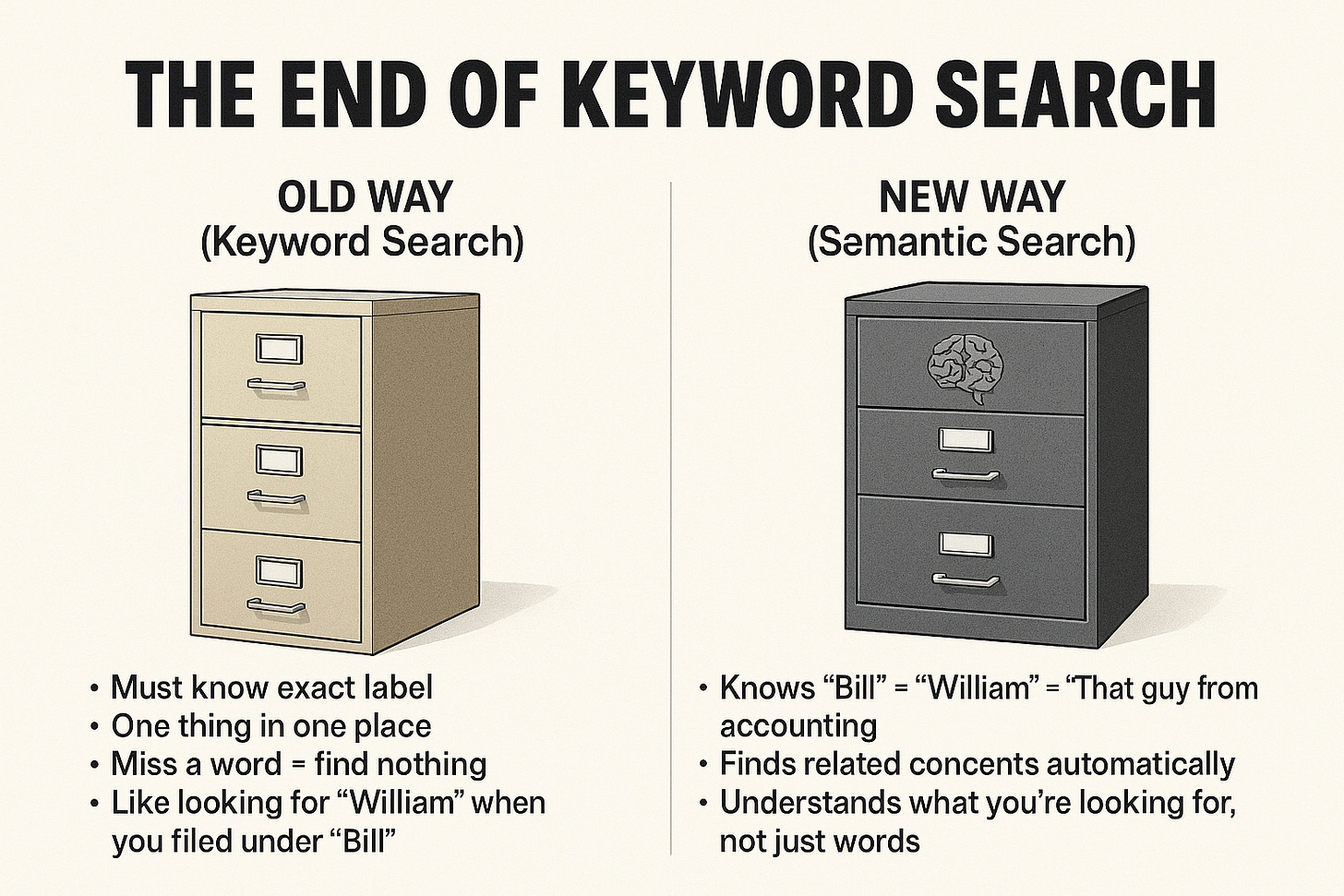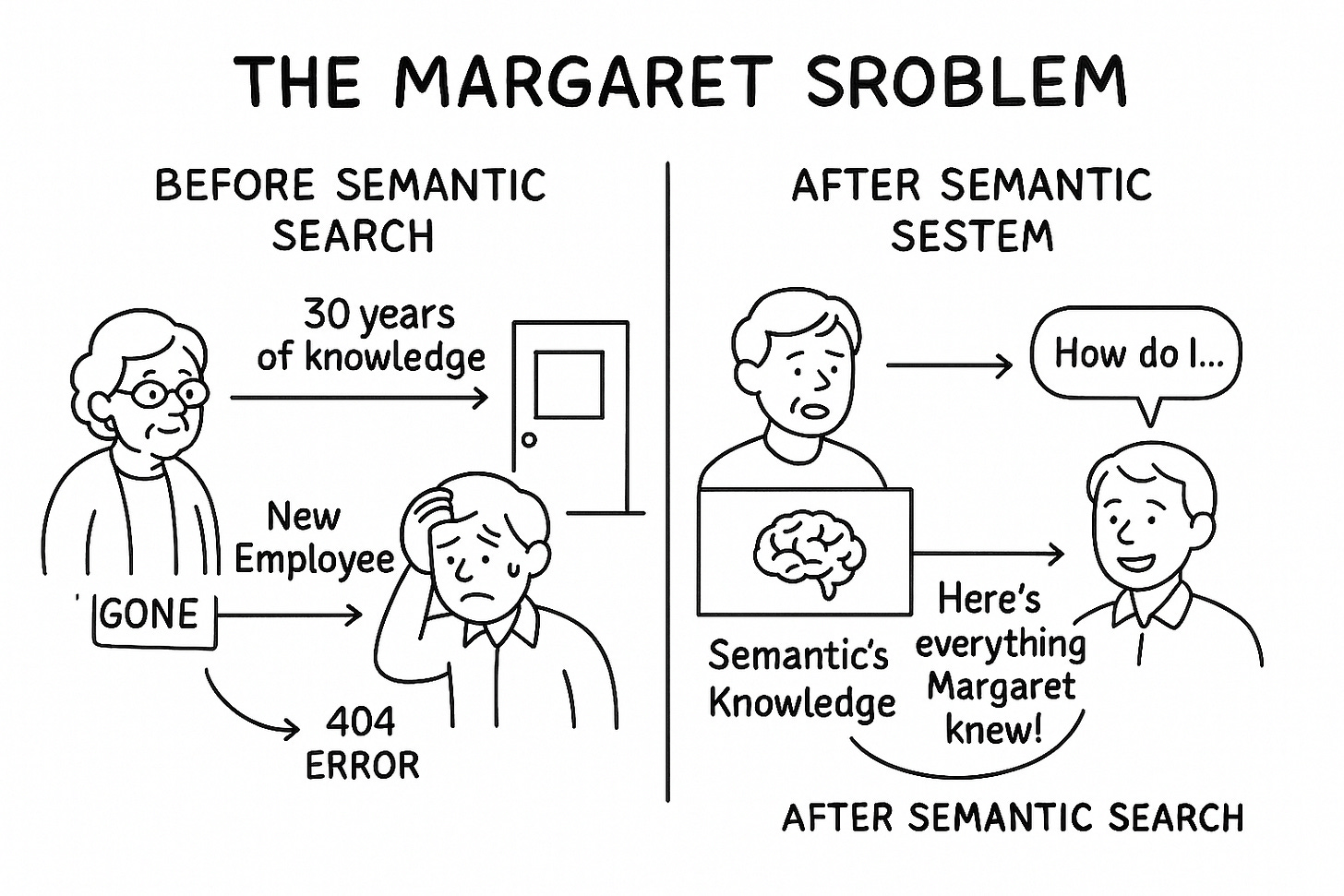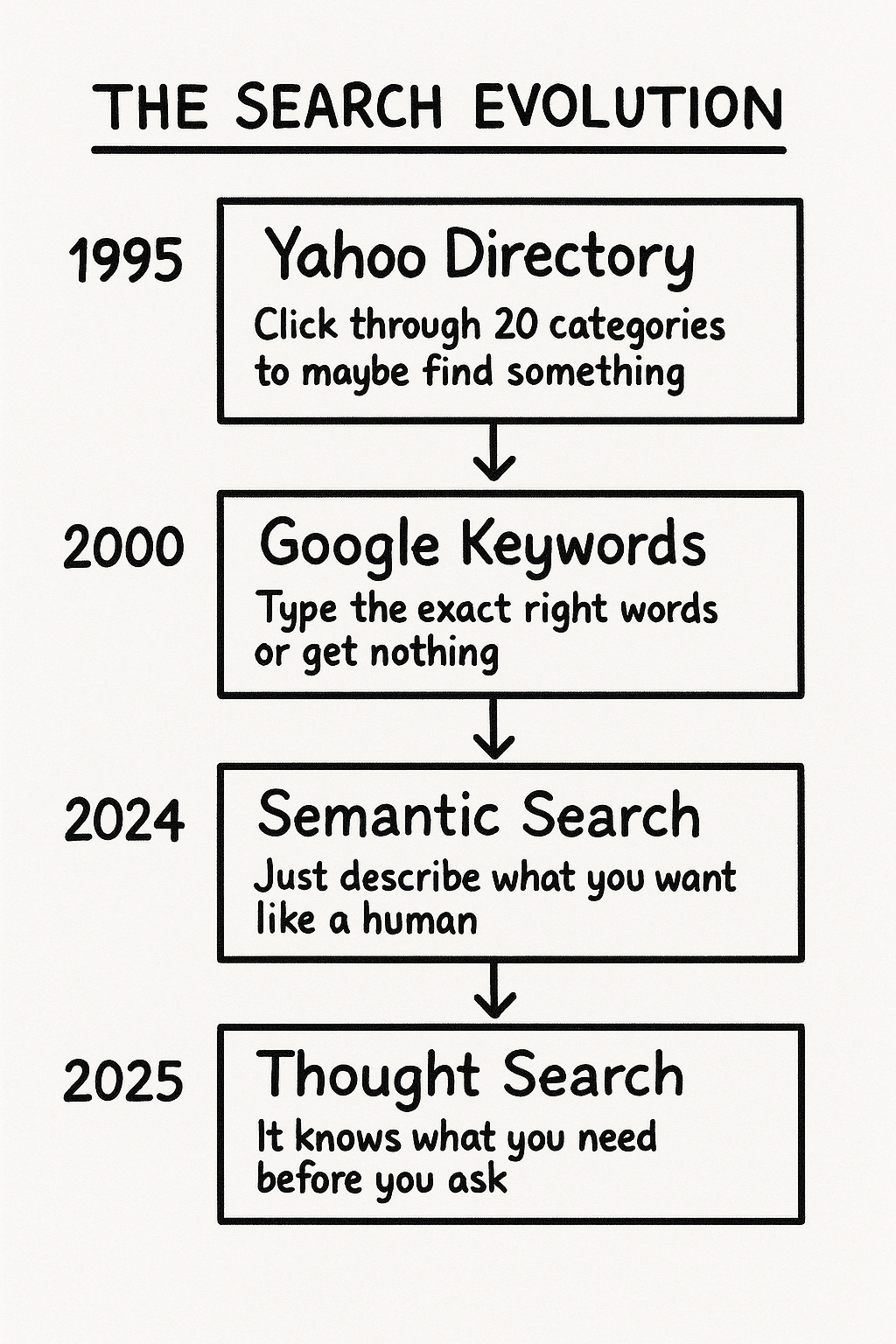Day 2: Google Search is Having a Mid-Life Crisis (And Your Grandma Could Build Something Better)
Remember when you had to memorize the exact name of every file on your computer? Yeah, that’s about to sound as ridiculous as using a paper map to navigate.
Listen, I need to tell you about the most important tech shift that nobody’s explaining properly.
It’s not AI. It’s not crypto. It’s not even those Vision Pro headsets that make people look like they’re skiing indoors.
It’s the death of “keyword search” - and if you’re still typing exact phrases into search boxes hoping for magic, you’re basically using a rotary phone in the iPhone era.
Let Me Paint You a Picture
You know that frustrating moment when you KNOW you saved something important, but can’t remember what you called it?
Maybe it was:
“Budget_Final_FINAL_v2_actually_final.xlsx”
“March meeting notes”
“That important thing from Bob”
Traditional search is like having a filing cabinet where you can only find things if you remember the EXACT label you wrote. Miss one word? Sorry, that document doesn’t exist anymore.
Semantic search? It’s like having a brilliant assistant who remembers everything and understands what you MEAN, not just what you SAY.
Here’s How My 83-Year-Old Granny Finally Got It
I told her: “Nani, imagine if your recipe box understood that ‘chocolate cake,’ ‘birthday dessert,’ and ‘that thing with cocoa’ all mean the same thing.”
Her eyes lit up. “So I don’t have to remember if I filed it under ‘Desserts’ or ‘Cakes’ or ‘Great Grandma’s Recipes’?”
Exactly.
The “Holy Shit” Moment That Changed Everything
Last week, a Fortune 500 CEO told me this story:
His legal team spent THREE MONTHS and $400,000 reviewing documents for a lawsuit. They were searching for evidence of “contract violations.”
They missed 60% of relevant documents.
Why? Because those documents used phrases like:
“Failed to meet obligations”
“Didn’t honor the agreement”
“Breach of terms”
“Non-compliance with stated requirements”
Old search: “Show me ‘contract violations’ only” Semantic search: “I understand you want ANYTHING about broken agreements”
The difference? About $2 million in settlement costs.
Let’s Make This Real With Your Actual Life
Your Email Nightmare - SOLVED
Old Way: “Where’s that email about the Johnson project?” Result: Nothing (because the email never used the word “Johnson”)
Semantic Way: “Where’s that email about the Johnson project?” Result: Finds emails mentioning “Q3 client presentation,” “Milwaukee meeting,” and “architectural review” - because it KNOWS that’s the Johnson project
Your Company’s Documentation Hell - FIXED
Every company has that one person - let’s call her Margaret - who knows where everything is. When Margaret retires, the company is screwed.
With semantic search, Margaret’s knowledge becomes immortal. New employees can search “How do we handle refunds?” and find:
Return policy documents
Customer service scripts
Accounting procedures
Legal guidelines
Margaret’s handwritten notes from 2019
Even though NONE of them contain the word “refund.”
The Technical Stuff (Explained Like You’re Five)
Imagine every word and idea as a house in a massive neighborhood.
Old search: You need the exact address
Semantic search: You just describe the house (”the blue one with the big oak tree”) and it finds it
Here’s the magic - computers turn words into “coordinates” in space:
“Dog” might live at coordinates [0.2, 0.8, 0.3]
“Puppy” lives next door at [0.21, 0.79, 0.31]
“Cat” lives across town at [0.7, 0.2, 0.8]
The computer now knows “dog” and “puppy” are neighbors (related) while “cat” is distant (less related).
Read more about vector embeddings - this 27-minute video explains it better than any technical manual.
Why Every Business is Secretly Panicking
Companies are realizing they’re sitting on goldmines of information that nobody can find.
The Average Enterprise Reality:
10,000+ documents
50+ systems
20+ years of accumulated knowledge
0% of it actually findable
The Semantic Search Revolution:
Same documents
Same systems
Same knowledge
95% findable in natural language
A law firm in NYC just told me they went from 8 paralegals doing document review to 2. The other 6? They’re now doing actual legal work instead of playing “find the needle in the haystack.”
Build Your Own Semantic Search This Weekend (Yes, Really)
The “I’m Not Technical” Version:
Use Notion or Obsidian - They have semantic search built in. Just dump your documents and start searching naturally.
For Google Drive: Install Google’s Cloud Search. It’s like steroids for your file search.
For Everything Else: Try Algolia or Typesense. They have copy-paste setup guides your teenager could follow.
The “I Want to Impress My Tech Friends” Version:
# This is literally all the code you need
from sentence_transformers import SentenceTransformer
import numpy as np
# Load a pre-trained model (it’s free!)
model = SentenceTransformer(’all-MiniLM-L6-v2’)
# Your documents
docs = [”I love pizza”, “I enjoy pasta”, “Cars are fast”]
# Convert to vectors (the magic coordinates)
vectors = model.encode(docs)
# Search for something
query = “Italian food”
query_vector = model.encode([query])
# Find the most similar
similarities = np.dot(vectors, query_vector.T)
best_match = docs[np.argmax(similarities)]
print(f”You searched: {query}”)
print(f”Best match: {best_match}”)
Copy this code and try it yourself. It takes 2 minutes.
The Dirty Secret Nobody’s Talking About
RAG (Retrieval Augmented Generation) is basically semantic search on steroids - it fetches real information from your documents instead of making stuff up.
When ChatGPT gives you wrong information?
That’s because it’s guessing. When it’s connected to semantic search? It’s actually looking up real facts.
This is why every company claiming to have “AI” is really just slapping semantic search on their old database and charging 10x more.
Real Companies Getting Destroyed (Or Winning)
DESTROYED: McDonald’s shut down their AI drive-thru after it kept adding bacon to ice cream orders and $166 worth of chicken nuggets to orders - because it couldn’t understand context, only keywords.
WINNING: Spotify’s “vibe search” - You can literally search “songs for crying in the rain” and it understands you want sad, slow, atmospheric music. Try that with keyword search.
DESTROYED: Air Canada’s chatbot cost them $812 in court after it made up a refund policy that didn’t exist - keyword matching without understanding.
WINNING: Pinterest’s visual search - Take a photo of any outfit and find similar styles. No words needed.
What This Means For You (The Part That Actually Matters)
If You’re An Employee:
Stop memorizing company jargon
Start asking questions naturally
Your value isn’t in knowing where things are filed anymore
It’s in knowing what to do with what you find
If You’re A Manager:
Your new employees can be productive on Day 1
Your documentation actually becomes useful
Margaret can finally retire
You stop losing lawsuits over missed emails
If You’re A Founder:
Your competitor using keyword search is already dead
They just don’t know it yet
Semantic search is your unfair advantage
It costs less than one employee’s salary to implement
The Next 6 Months Will Be Insane
Google is panicking - Their entire business model assumes you need to guess the right keywords
Every SaaS is scrambling - Adding “AI-powered search” (aka semantic search) to justify price increases
Data is becoming liquid - Information silos are dissolving because semantic search doesn’t care about your folder structure
Your Action Plan (Do This Today)
Test Your Current Search: Try finding an old email using a vague description. Fail? You need semantic search.
Start Simple: Install Readwise for articles, Mem for notes, or Rewind for everything on your computer.
For Your Company: Run this experiment - Have 5 people search for the same document using different words. If they get different results, you’re bleeding productivity.
Learn More: This free course explains everything in 1 hour.
The Bottom Line
We’re living through the biggest shift in information retrieval since Google invented PageRank.
But unlike blockchain (remember that?), this actually works. Unlike the metaverse (RIP), people actually need this. Unlike AI chatbots, this doesn’t hallucinate.
It just finds your stuff. All of it. No matter how you ask.
And if you’re still using keyword search in 2025, you’re basically sending telegrams while everyone else is texting.
Day 3: “Why Your Company’s Data is Worth Nothing (And How to Make it Worth Millions)” - I’ll show you how Domino’s Pizza is using their delivery data to predict divorces, and why your spreadsheets might be more valuable than your products.
P.S. - Want to know if your company needs semantic search? Here’s a simple test: Ask 3 employees to find last quarter’s budget report. If they take more than 30 seconds or find different documents, you’re already losing money.
P.P.S. - Share this with someone still using Windows File Explorer search. They need help.
The BSKiller Test: Ask your search bar: “That thing we talked about last month with the numbers” - If it finds nothing, welcome to the stone age.





